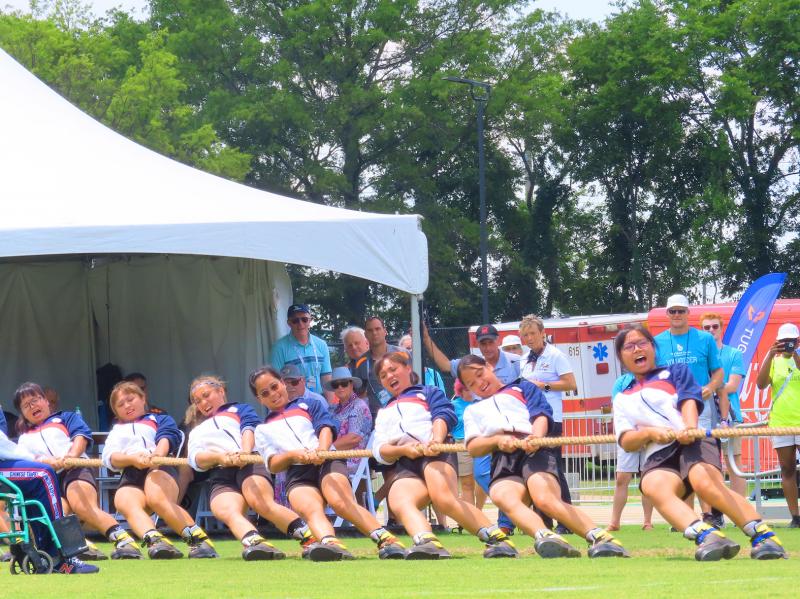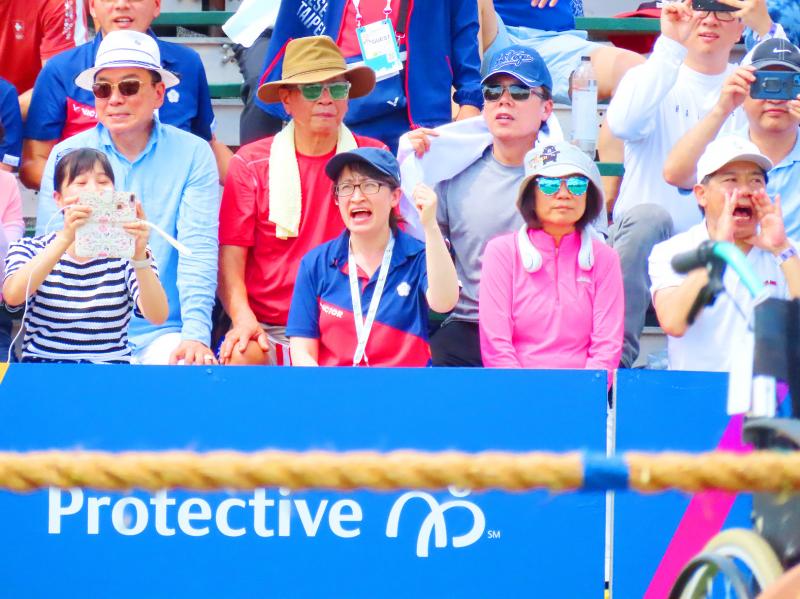Taiwan’s women’s tug-of-war team on Friday swept the outdoor 540kg division to bag the nation’s first gold at the World Games in Birmingham, Alabama, and their fifth consecutive gold medal at the international multisport event.
Taiwan defeated Sweden 3-0 in the finals at the University of Alabama at the Birmingham Track and Field Complex to remain undefeated in the six-team preliminary round.
“Five consecutive championships in 21 years is really not easy,” the national Tug of War Association wrote in an online post.

Photo: CNA
After qualifying for the World Games last year, Taiwan continued to train despite the difficulties caused by the COVID-19 pandemic, but they never gave up, demonstrating their determination, the association said.
Taiwan head coach Kuo Sheng (郭昇) said the victory did not come easy, as some of his athletes are high-school students and are not as experienced as older members on the squad.
Luckily, the collective focus and unity of the nine-member team produced impressive results, Kuo added.

Photo: CNA
In the final, Taiwan won their first and second pulls in 26 seconds and 18 seconds respectively to win the best-of-three match.
Switzerland won bronze, while the UK, the Netherlands and Germany finished fourth, fifth and sixth respectively.
President Tsai Ing-wen (蔡英文) praised the gold medalists on Facebook yesterday, saying that everyone in Taiwan was proud of their achievement.
During the competition, the athletes showed the results of their long-term training, and performed uniformly and with a sense of rhythm, she wrote.
Tsai also praised the hard work of the coaches, including Kuo, who continued to train the athletes, despite being badly injured in a cycling accident.
Vice President William Lai (賴清德) and Premier Su Tseng-chang (蘇貞昌) also posted messages of congratulations on Facebook, with Lai saying the athletes’ achievements put Taiwan in the limelight.
Also on Friday, Taiwan’s Wei Chu-cheng (魏居正) fell short of winning a bronze in the men’s 85kg jujutsu, losing 9-6 to Germany’s Daniel Zmeev.
Earlier in the day, Zmeev blanked Wei in their Pool A match, winning 14-0. Wei then won his next Pool A fight, defeating Mexico’s Balam Quitze 13-9 to set up a semi-final bout against Serbia’s Nikola Trajkovic, which the 31-year-old Taiwanese won 14-17.
Taiwan’s Chou Chieh-yu beat South Korea’s Park Eun-ji 9-1 to advance to the women’s 9-ball semi-finals. Chou, 35, was yesterday to play Germany’s Veronika Ivanovskaia, with the winner later yesterday competing for gold, and the other for bronze.
Taiwan’s mixed korfball team won their Group A preliminary against Portugal 19-11, setting them up to face Belgium in yesterday’s semi-finals.
In men’s freestyle wakeboard, Taiwan’s Yang Yu-yeh finished atop the last-chance qualifiers heat with 55.67 points. The 15-year-old was yesterday to compete in the first heat of the semi-finals.
In men’s canoe polo, the Taiwanese team lost both of their Group B preliminary-round matches, with the Netherlands winning 8-2 in the early match, and Italy winning 3-2 in the evening one. Taiwan were yesterday to face France in the quarter-finals.
Taiwan as of Friday had 11 medals, with one gold, five silvers and five bronzes.
Germany were atop the medal standings with 21 golds, four silvers and 14 bronzes, followed by Italy with 11 golds, 21 silvers and 12 bronzes. The US were in third with 11 gold, 11 silvers and six bronzes.
The Games end tomorrow.

NO LIVERPOOL TRIP: Taiwan’s Lin Yu-ting, who won a gold medal in the boxing at the Paris Olympics, was embroiled in controversy about her gender at that event Taiwanese boxer Lin Yu-ting (林郁婷) will not attend this year’s World Boxing Championships in Liverpool, England, due to a lack of response regarding her sex tests from the organizer, World Boxing. The national boxing association on Monday said that it had submitted all required tests to World Boxing, but had not received a response as of Monday, the departure day for the championships. It said the decision for Lin to skip the championships was made to protect its athletes, ensuring they would not travel to the UK without a guarantee of participation. Lin, who won a gold medal in the women’s 57kg boxing

RESPONSE: The transit sends a message that China’s alignment with other countries would not deter the West from defending freedom of navigation, an academic said Canadian frigate the Ville de Quebec and Australian guided-missile destroyer the Brisbane transited the Taiwan Strait yesterday morning, the first time the two nations have conducted a joint freedom of navigation operation. The Canadian and Australian militaries did not immediately respond to requests for comment. The Ministry of National Defense declined to confirm the passage, saying only that Taiwan’s armed forces had deployed surveillance and reconnaissance assets, along with warships and combat aircraft, to safeguard security across the Strait. The two vessels were observed transiting northward along the eastern side of the Taiwan Strait’s median line, with Japan being their most likely destination,

‘NOT ALONE’: A Taiwan Strait war would disrupt global trade routes, and could spark a worldwide crisis, so a powerful US presence is needed as a deterrence, a US senator said US Senator Deb Fischer on Thursday urged her colleagues in the US Congress to deepen Washington’s cooperation with Taiwan and other Indo-Pacific partners to contain the global security threat from China. Fischer and other lawmakers recently returned from an official trip to the Indo-Pacific region, where they toured US military bases in Hawaii and Guam, and visited leaders, including President William Lai (賴清德). The trip underscored the reality that the world is undergoing turmoil, and maintaining a free and open Indo-Pacific region is crucial to the security interests of the US and its partners, she said. Her visit to Taiwan demonstrated ways the

The US has revoked Taiwan Semiconductor Manufacturing Co’s (TSMC, 台積電) authorization to freely ship essential gear to its main Chinese chipmaking base, potentially curtailing its production capabilities at that older-generation facility. American officials recently informed TSMC of their decision to end the Taiwanese chipmaker’s so-called validated end user (VEU) status for its Nanjing site. The action mirrors steps the US took to revoke VEU designations for China facilities owned by Samsung Electronics Co and SK Hynix Inc. The waivers are set to expire in about four months. “TSMC has received notification from the US Government that our VEU authorization for TSMC Nanjing